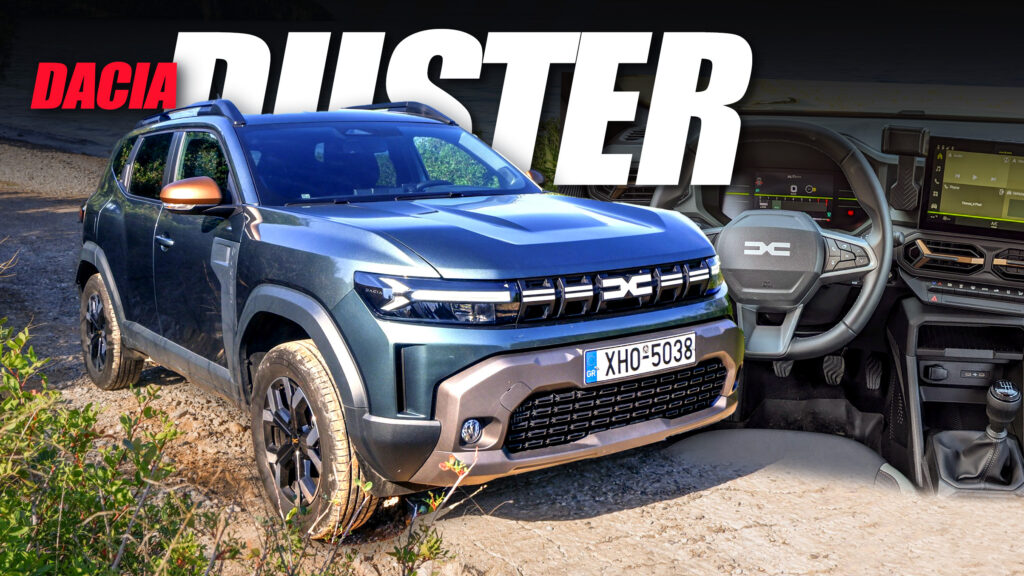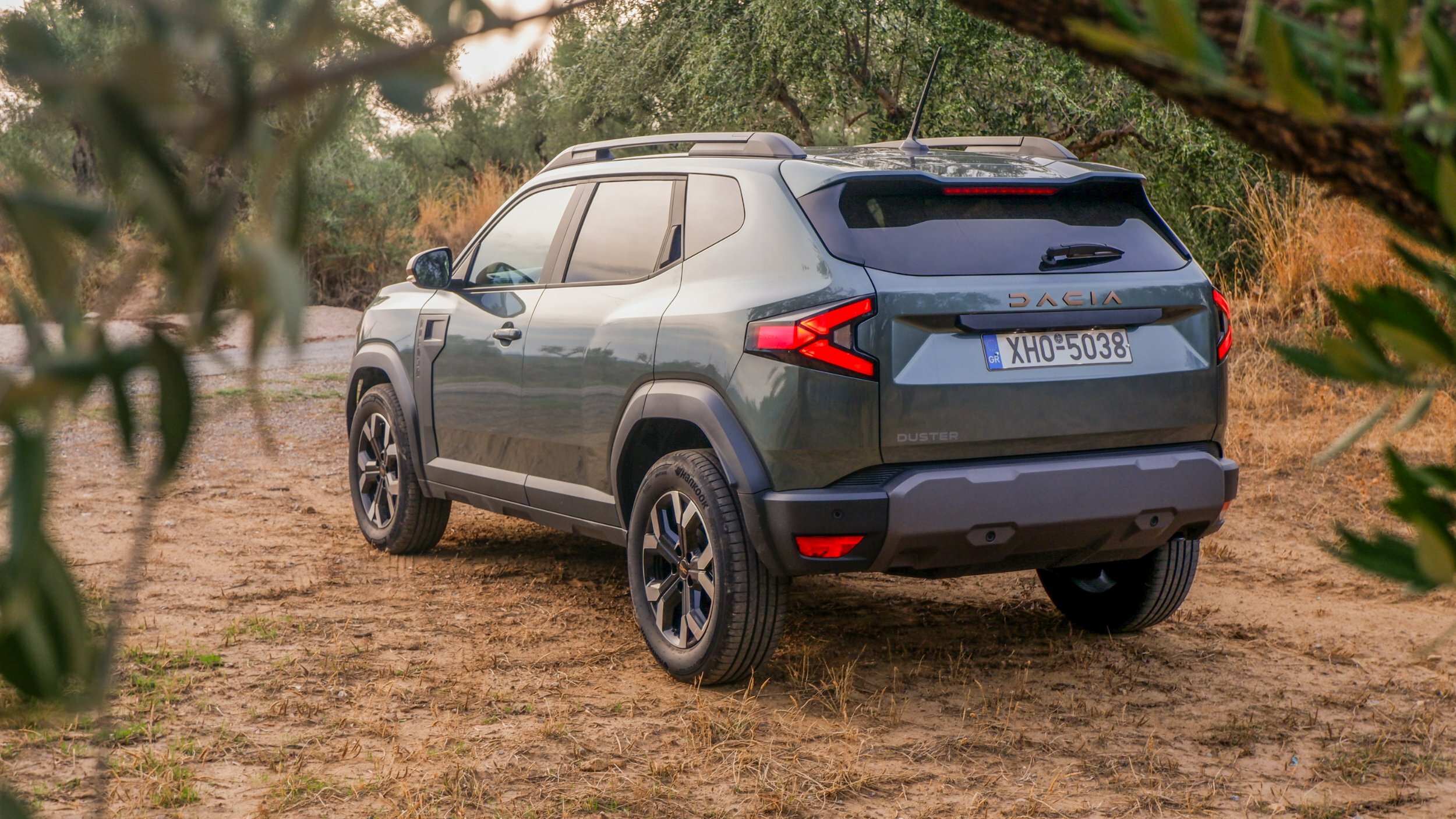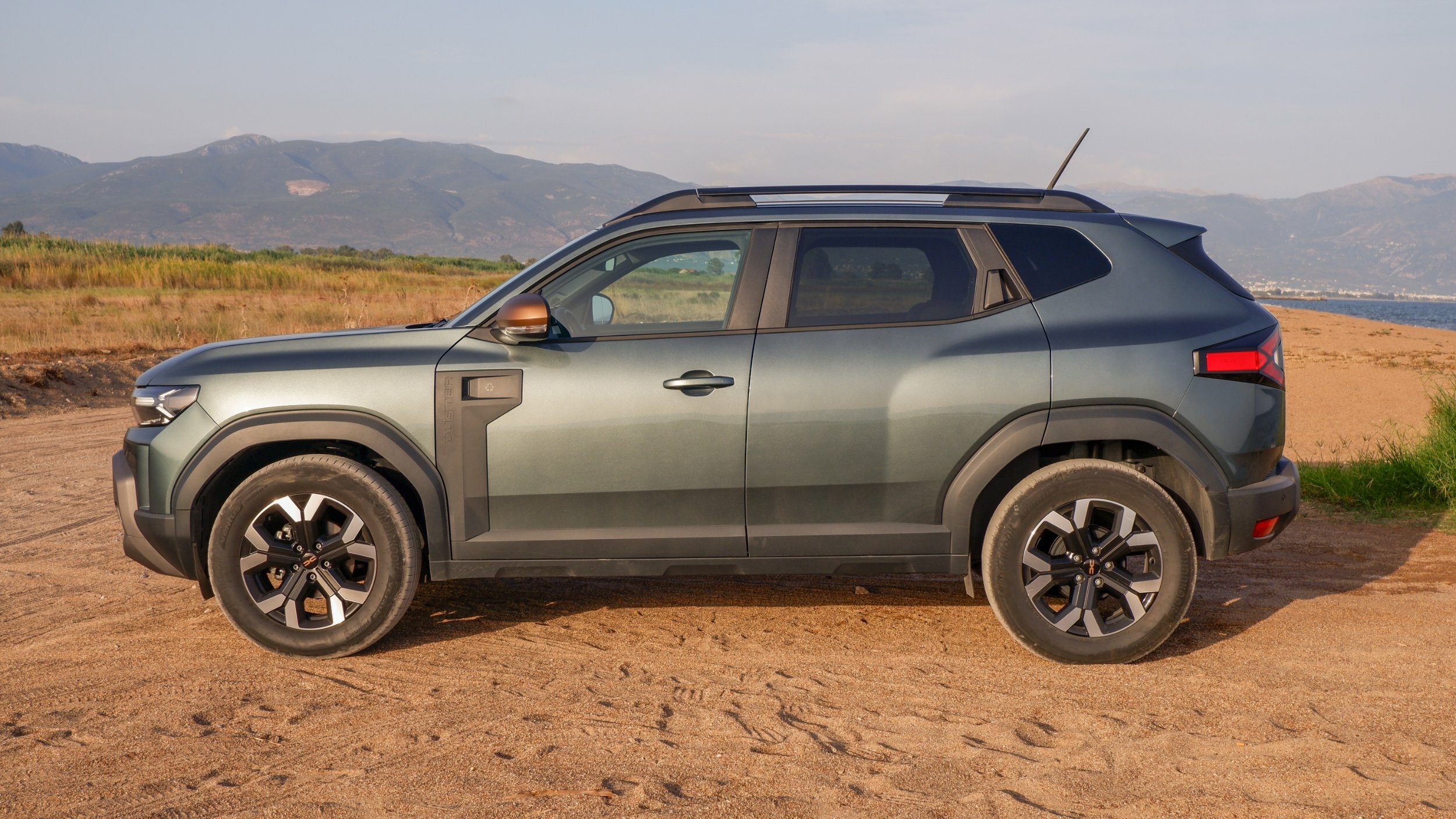Dacia is steadily transforming into a desirable brand for a specific type of audience, proving that cars can be both budget-friendly and cool at the same time. Leading the charge is the new Duster, which embodies the core values of the Romanian automaker while ushering the brand into a new era.
We recently tested the updated subcompact SUV, equipped with the entry-level 1.0-liter Eco-G powertrain, across various driving conditions to see how much it has evolved and improved compared to its popular predecessors.
Review: Jeep Avenger Proves ICE And Manual Combo Can Still Be Compelling
Launched in November 2023, the third-generation Duster brings significant updates, both inside and out. Dacia’s new design language gives the vehicle a more substantial presence, even though it has only grown by 23 mm (0.9 inches), bringing its total length to 4,343 mm (171 inches).
Currently, the only subcompact SUVs in Europe longer than the Duster are the Citroen C3 Aircross and Opel Frontera twins. However, Dacia will soon unveil the new Bigster, effectively a stretched version of the Duster with a seven-seater option stepping its toes in the compact SUV segment.
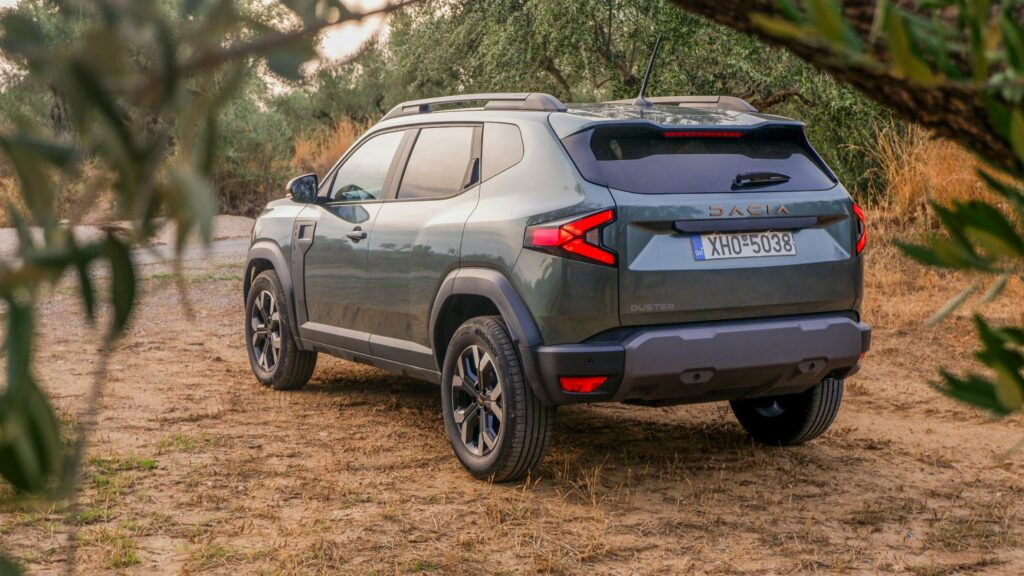
Quick Facts
In terms of design, the sharp LED lighting, boxy fenders, and narrow windows enhance the SUV’s rugged stance, complemented by a generous amount of protective cladding made from 20% recycled plastic. The Duster also maintains the highest ground clearance in its class—209 mm (8.2 inches) for the FWD models and a more substantial 217 mm (8.5 inches) for the 4×4 version.
Modern Platform and Driving Manners
While the fresh styling is appealing, the most significant update lies beneath the surface: the adoption of the CMF-B architecture. This modern platform replaces the aging B0 underpinnings used in previous Duster models, which date back to the early 2000s. The new architecture is shared across all ICE-powered Dacias and several other models from the Renault Group, including the Renault Captur and Symbioz.
Getting behind the wheel of the new Duster, you immediately notice the improvements brought by the new and stiffer chassis. The suspension was always on the plush side, but the handling and the ride quality have been improved with less body roll in the corners and a more sturdy feeling on the road. While the Duster may not match the refinement and noise, vibration, and harshness (NVH) levels of its pricier Renault counterparts, it’s as comfortable and modern as it gets for a model rocking the Dacia emblem.
More: 2024 Dacia Spring EV Gets Duster-Inspired Looks And An Overhauled Interior
The Duster was never intended to be sporty, but we do wish its steering offered more road feedback and felt heavier at higher speeds. The brakes—discs in the front and drums in the rear—require more pedal pressure than you might expect, but that’s something that you quickly get accustomed to and comes in handy when driving on low-grip terrains.
Our off-road experience with the Duster included some bumpy gravel and rocky uphill roads, where it performed neatly considering the limitations of its FWD layout. In general, it’s an SUV that encourages you to venture further without worrying about getting dirty. The AWD version, available exclusively with the mild-hybrid 1.2-liter TCe 130 powertrain, seems like the sweet spot of the lineup, although it comes with a significant price increase over the base model.
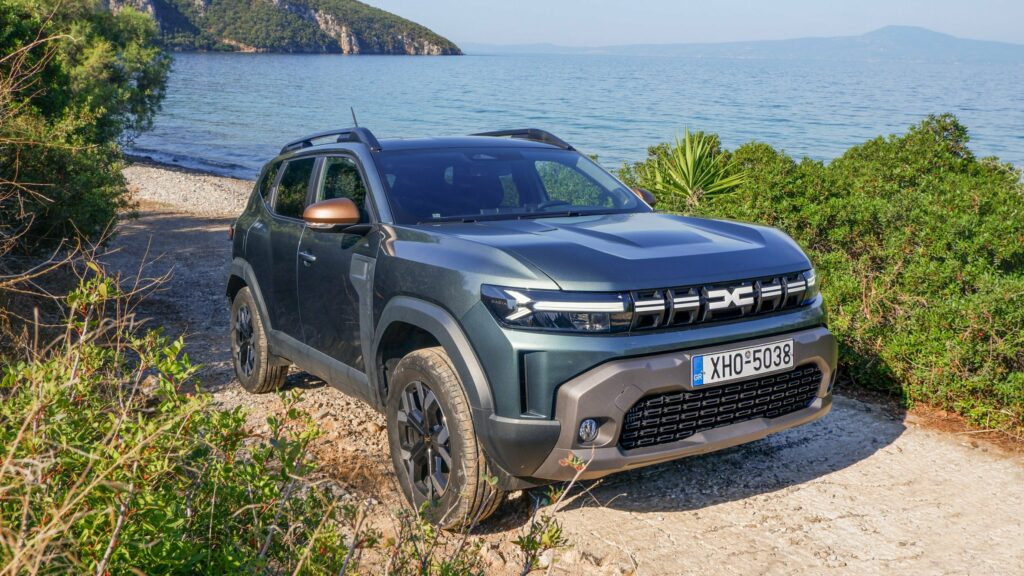
How Good Is The LPG Version?
And now let’s talk about that tiny powertrain—the carryover turbocharged 1.0-liter three-cylinder engine that runs on both gasoline and LPG. Its bi-fuel capability positions it as a replacement for the discontinued diesel, offering low running costs, though it falls short in torque. Dacia recently sold its one millionth LPG-powered vehicle, demonstrating that there is indeed a market for this technology.
The engine actually delivers slightly more power when running on LPG—99 hp compared to 89 hp on gasoline. However, the biggest selling point is the lower cost of LPG and the potential for long-term savings, making it an attractive option for daily driving. Switching between fuels is seamless, done at the touch of a button, with the digital instrument cluster providing real-time updates on the remaining range for both fuel types.
According to our rough calculations, based on fuel consumption figures and current prices, running on LPG costs about half as much as running on gasoline.
Dacia claims the Duster Eco-G can cover up to 1,300 km (808 miles) between refueling stops, thanks to the combination of a regular gasoline tank and an LPG container. However, the LPG tank is mounted under the boot floor, which unfortunately sacrifices space for a much-needed spare tire.
In terms of performance, despite what the specs suggest, the engine feels adequate at low speeds, helped by the fact that the Duster didn’t gain much weight in this latest generation. It’s only after hitting around 120 km/h (75 mph) that the entry-level powertrain begins to feel sluggish, and the engine’s raspy tone becomes more noticeable inside the cabin. For those seeking better performance, the mild-hybrid 1.2 TCe 130 is a more potent option, though it sacrifices the economic benefits of LPG.
What It’s Like On The Inside?
The interior of the previous Duster was starting to show its age, so Dacia’s designers put serious effort into modernizing it. The new dashboard feels as rugged as the SUV’s exterior while incorporating updated technology—though this excludes the bare-bones entry-level trim.
As expected, hard plastics cover every surface of the interior, even in the high-spec Duster Extreme shown here. But that’s not much of a drawback, as Dacia buyers typically prioritize practicality over soft-touch materials.
The centerpiece of the interior is the new 10.1-inch infotainment touchscreen that looks sharp and is pretty easy to use, without unnecessary gimmicks. Next to it, you’ll find Dacia’s signature smartphone holder, which keeps your device secure and is especially useful when wireless Android Auto refuses to connect.
Some ergonomic issues include the placement of the armrest, which obstructs access to the physical handbrake (though this won’t be a problem in trims with an electronic handbrake), and the oddly positioned volume buttons, which sit on top of the screen along with the on/off switch.
On the plus side, the physical switches for climate controls, located below the central touchscreen, make things simpler for the driver—no fumbling with touchscreen menus. Similarly, the conveniently placed button to the left of the steering wheel allows you to turn off the ADAS suite or configure it to be less intrusive when needed.
While Dacia has recently equipped its models with a basic driver-assistance package, now required by law, the brand stubbornly continues to resist offering more advanced features like adaptive cruise control.
The rugged exterior styling, while appealing, results in a rather narrow windshield and a high beltline, which limits visibility—especially for toddlers, who may find themselves staring at plastic door panels rather than the outside world.
And that leads us to one of the Duster’s greatest strengths; interior space. Despite only a slight increase in dimensions, the cabin feels roomier compared to the already spacious previous generation. Headroom and legroom are approaching compact SUV levels, making the Duster an attractive option for families.
The boot is also quite large and practical, with a wide opening. The cargo capacity is up to 474 liters (16.7 cubic feet) in the mild-hybrid FWD version, though it drops to 400 liters (14.1 cubic feet) in the LPG-powered model due to the placement of the gas tank.
Our Duster Extreme comes equipped with “TEP MicroCloud” seat upholstery, which is washable but lacks the breathability of traditional fabric. As a result, you may find yourself sweating more easily, particularly if you’re driving in hotter regions like the Mediterranean.
More: Converting The Dacia Jogger Into A Budget Four-Seater Limo
Another feature worth mentioning is the YouClip system, with three or five grip points scattered around the cabin for mounting a number of compatible accessories. These can be purchased from Dacia dealers and currently include a tablet stand, a storage pouch, an induction charger, or a cup holder that triples as a bag hook portable light.
For owners who enjoy camping, the optional “Sleep Pack” is worth considering. It adds a foldable bed and extra storage compartments, making the Duster a versatile companion for outdoor adventures.
Pricing and Equipment
Starting at €19,950 ($22,270), the new Dacia Duster may not be the absolute cheapest subcompact SUV, but it certainly offers excellent value for money when you consider everything you’re getting.
The base Essential trim comes with steel wheels and minimal features, so most buyers will likely gravitate toward the mid-spec Expression, starting at €22,390 ($25,013). This trim includes a digital cockpit with a 10.1-inch infotainment system, a rearview camera, and 17-inch wheels, all while still undercutting most of its competitors in price.
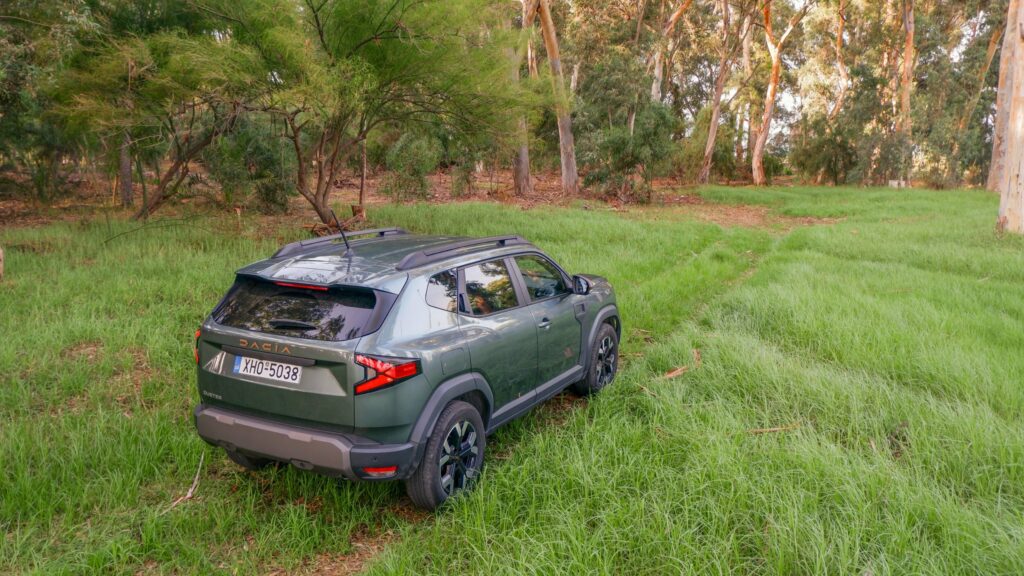
Our tester is the flagship trim called Extreme, which costs €25,990 ($29,034) with the 1.0-liter Eco-G powertrain. For the same price, you could also opt for the top-spec Duster Journey, which swaps out the Extreme’s rubber floor mats and YouClip features for an electronic handbrake and wireless charging.
Interestingly, upgrading to the beefier mild-hybrid 1.2 TCe 130 powertrain costs only €600 ($670) more in the Extreme, making it a no-brainer. In any case, at this price point, the Duster effectively loses its bargain status, as it surpasses the entry-level trim of the Nissan Qashqai, which belongs to the larger compact SUV segment.
Looking at the rest of the Duster lineup, the mild-hybrid 4×4 version starts at €26,990 ($30,152), while the most powerful option—the FWD-only self-charging hybrid—begins at €28,890 ($32,275). At least with these models, the entry-level trim is the more generously equipped Expression.
The Rivals
Subcompact SUVs are quite popular in Europe, meaning that the segment has numerous options to choose from. The closest rival of the Dacia Duster in terms of character and target audience is likely the Suzuki Vitara, which received its latest refresh in 2024, despite being around largely unchanged since 2014.
Those in search of space and practicality might want to consider the upcoming Citroen C3 Aircross and Opel Frontera, both expected to offer even more room for the price, along with the option of a third row of seats. A potential internal rival could be the slightly longer Dacia Jogger crossover wagon, although it looks too much like a stretched Sandero to steal away the Duster’s shine.
More: Jeep Avenger And Dacia Duster Get Disappointing 3-Star Ratings In Euro NCAP
On the other hand, buyer who prioritize rugged looks will likely have the Jeep Avenger on their radar, though it’s smaller and more expensive than the Duster.
Verdict
The Dacia Duster III remains an almost unbeatable value proposition, combining rugged styling with modern underpinnings and a spacious interior. It brings significant improvements over its predecessor, becoming more comfortable and livable without losing the no-frills charm that made it so popular in the first place.
Compared to pricier rivals, there are still some compromises in perceived quality, steering feedback, and NVH (noise, vibration, and harshness), though these issues are much less noticeable than before. The tiny three-cylinder bi-fuel engine in the base model is adequate for daily driving but struggles when pushed on the highway. For those willing to sacrifice the low running costs of the LPG model, the more powerful mild-hybrid version likely resolves these performance concerns.



